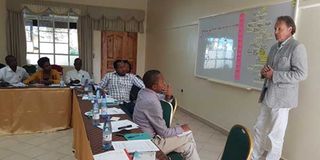Agriculture experts in Naivasha for training on communication skills

Stakeholders in the agriculture during a training on communication skills in Naivasha. The 15 trainees were drawn from different agricultural sectors. PHOTO | RACHEL KIBUI | NATION MEDIA GROUP
What you need to know:
- All participants are trainers of trainees having been earlier trained through Smap.
- The training was eye-opening to participants on whom many trainees, mostly farmers rely on.
- The training covered simplicity, understanding body language and creating memorable moments among trainees.
Stakeholders in the agriculture sector converged in Naivasha for a training aimed at equipping them with communication skills.
The 15 trainees were drawn from different agricultural sectors including aquaculture, horticulture and veterinary services among others.
All participants are trainers of trainees having been earlier trained through the Standards and Market Access Programme (Smap) to cover different sectors.
As it emerged, good communication skills are very vital in the agricultural sector especially where they are expected to train farmers and other stakeholders.
“Usually, what we look at is whether a farmer can do as we train them (to do) practically,” said Nazaria Nyaga, a veterinary officer and one of the trainees.
“However, what we have for long not taken into consideration is that it matters a lot how we pass information,” he added.

An outdoor training session. PHOTO | RACHEL KIBUI | NATION MEDIA GROUP
IMPACT
While training in communication skills has mostly been a reserve for people in some fields such as journalism and public relations, how information is passed, both verbally and non-verbally, greatly impacts on the fruit it bears.
“I now know that even body language matters a lot if I want to [have] impact on the way I communicate,” said Margaret Gatonye, the Executive Officer of Aquacultural Association of Kenya (AAK).
Facilitated by Dr Wolfgang Hackl, an international trainer from Austria, the training was eye-opening to participants on whom many trainees, mostly farmers rely on.

Participants during a communication skills training for agricultural experts in Naivasha. PHOTO | RACHEL KIBUI | NATION MEDIA GROUP
TOPICS
Among the main topics covered in the training were simplicity, understanding body language and creating memorable moments among trainees.
Since its launch slightly over two years ago, Smap has facilitated trainings of numerous trainers in horticulture, dairy, apiculture and meat sectors.
However, with most trainers of trainees who have benefitted being technical experts, it was found necessary to equip them with communication skills that will ease their quest of informing and consequently impacting positively.
“This training has made me a better person,” confessed Patrice Kimondiu, a technical officer at Fresh Produce Exporters Association.
As a trainer, he added, there were numerous things he thought were right, and others he ignored but he has since learnt how he should do them.

Those who attended the training said it was an eye opener as they learnt new things that they previously took for granted. PHOTO | RACHEL KIBUI | NATION MEDIA GROUP
FUNDED BY EU
Funded by the European Union (EU), Smap aims at raising standards and expanding markets in horticulture, apiculture, aquaculture, meat and dairy sectors.
Smap’s National Coordinator Christine Misiko hailed the training saying it would go a long way in ensuring delivery of trainings passed to the trainers.
“The training will definitely enable those who were trained through the programme to effectively pass the same information to the targeted beneficiaries,” she said.
Although the programme ends in a few weeks’ time, she added, the impact will continue through the knowledge that has been passed on to different stakeholders.
Besides the trainings, Smap played a key role in assisting in eradication of mango fruit flies in Elgeyo-Marakwet by creating fruit flies free zones, and lifting of the ten per cent sampling of French beans in the EU market among others.
Smap is implemented by United Nations Industrial Development Organisation (Unido), Department of Veterinary Services (DVS), Kenya Plant Health Services (Kephis) and Kenya Bureau of Standards (Kebs)





